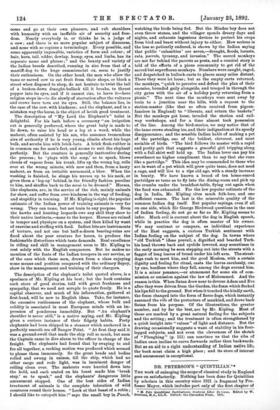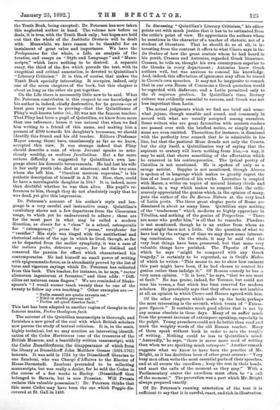DR. PETERSON'S " QUINTILIAN."* THE work of enlarging the scope
of classical study in England goes on satisfactorily. Nothing has been done for Quintilian by scholars in this country since 1821 (a fragment by Pro- fessor Mayor, which includes part only of the first chapter of
*M. Fabi Quintiltani institationis Oratoriz Liber De -inns. Edited by W. Peterson, M.A., LL.D. Oxford : the Clarendon Press. 1891.
the Tenth Book, being excepted). Dr. Peterson has now taken this neglected author in hand. The volume now before us deals, it is true, with the Tenth Book only ; bat hopes are held out that the whole of the Institutio Oratorio, will be dealt with. Meanwhile, we have reason to be thankful for an instalment of great value and importance. We have the Prolegomena for the whole, a Life, an analysis of the treatise, and essays on " Style and Language " and " Manu- scripts," which leave nothing to be desired. A separate essay, the third of the five which precede the text, with its exegetical and critical annotation, is devoted to Quintilian's " Literary Criticism." It is this, of course, that makes the Tenth Book specially interesting. It occupies, indeed, only one of the seven chapters of the book, but this chapter is about as long as the other six put together.
On the Life there is necessarily little new to be said. What Dr. Peterson contributes in this respect to our knowledge of his author is, indeed, chiefly destructive, for he proves—or at least goes very near to proving—that the Quintilianns of Pliny's well-known letter (vi., 32) was not the famous teacher. That Pliny had been a pupil of Quintilian, we know from more than one reference ; hence it was natural that when we find him writing to a friend of this name, and making him a present of £500 towards his daughter's trousseau, we should identify this friend and his old teacher. Editors (Professor Mayor among them) have, unanimously as far as we know, accepted this view. It was strange indeed that Pliny should describe a man of whom Juvenal speaks as noto- riously wealthy, as modicus facultatibus. But a far more serious difficulty is suggested by Quintilian's own lan- guage about his domestic bereavements. He had lost his wife in her early youth (she died at nineteen), and the two sons whom she left him. " Omnium meorum superstes," is his pathetic description of himself in A.D. 94. How, then, could be have a marriageable daughter in 104 ? It is, indeed, more than doubtful whether he was then alive. His pupil's re- ferences to him, though they do not absolutely imply that he was dead, yet give this impression.
Dr. Peterson's account of his author's style and lan- guage is a very careful and instructive essay. Quintilian's vocabulary shows not a few departures from the Ciceronian usage, to which yet he endeavoured to adhere ; these are for the most part in what may be called a modern direction, as classis for a " class " in a school, extemporalis
for extemporary," prosa for " prose," versificator for " versifier." His style was tinged with the antithetical and rhetorical colour of the age in which he lived, though, so far as he departed from the earlier symplicity, it was a case of the meliora probe, deteriora sequor, for he disliked and censured the passion for effect which characterised his contemporaries. He had himself no small power of writing with epigrammatic foroe, as is abundantly proved by the list of terse and vigorous sayings which Dr. Peterson has collected from this book. This teacher, for instance, is, he says, " rector alienorum ingeniorum et formator," and then adds : " Diffi- cilius est naturam suam fingere." We are reminded of Shake- speare's " I would sooner teach twenty than be one of the twenty to follow my own teaching." Other examples are :—
" Nulls mansit ars qualis invents est." " Nihil in studiis parvum est." " Pectus eat quod disertos facit."
This last has been adapted to another region of thought in the famous maxim, Pectus theologum facit.
The account of the Quintilian manuscripts is thorough, and furnishes a new proof of the zeal with which British scholars now pursue the study of textual criticism. It is, in the main, highly technical, but we may mention an interesting identifi- cation of the Codes Hartsianus (one of the treasures of the British Museum, and a beautifully written manuscript), with the Codes Duaseldorfianua, the disappearance of which from the library at Diisseldorff John Matthew Gesner (1691-1761) laments. It was sold in 1724 by the Diisseldorff librarian to one Zamboni, who was Charge d'Affaires to the Elector of Hesse-Darmstadt. Zamboni pretended to be collecting manuscripts, but was really a dealer, for he sold the Codex in the course of a few weeks to Harley. (Diisseldorff then belonged to Bavaria, but is now Prussian. Will Prussia reclaim this valuable possession ?) Dr. Peterson thinks that this same Codex may have been the one which Poggio dis- covered at St. Gall in 1416. In discussing " Quintilian's Literary Criticism," his editor points out with much justice that it has to be estimated from the critic's point of view. He appreciates the authors whom he mentions in the character of a teacher of rhetoric, not of a student of literature. That he should do so at all, is in- teresting from the contrast it offers to what Cicero says in the De Oratore of how the great orators whom he had heard in his youth, Crassus and Antonius, regarded Greek literature. Crassus, he tells us, thought his own countrymen superior to the Greeks in every department ; Antonius knew Greek authors well, but was anxious to conceal his knowledge. And, indeed, this affectation of ignorance may often be traced in Cicero's own speeches. It may not be inapposite to remark that in our own House of Commons a Greek quotation would be regarded with disfavour, and a Latin permitted only to the di majorunt gentium. In Quintilian's time, literary culture was evidently essential to success, and Greek was not less important than Latin.
The actual judgments which we find are brief and some- what jejune, though sensible and sound, and commonly in accord with what are usually accepted among ourselves. Some writers who are great favourites with modern readers are passed over with the briefest notice, or simply named ; some are even omitted. Theocritus, for instance, is dismissed with the perfectly true remark that he is admirable in his line, but that the pastoral Muse dreads not only the Courts, but the city itself, a Quintilianian way of saying that the aspirant to oratory will learn nothing from him,—a way, it may be said, that shows something of the affectation which he censured in his contemporaries. The lyrical poetry of Catullus is not mentioned. He is spoken of only as a savage satirist. Sappho is not mentioned, though Alcmus is spoken of in language which makes us greatly regret the loss of at least a portion of his works. Lucretius is coupled with Macer, a writer on topics of natural history (birds and snakes), in a way which makes us suspect that the critic scarcely appreciated the genius which, in the opinion of many, puts the author of the De Berunt Natura at the very head of Latin poets. The three great elegiac poets of Rome are dismissed in about as many lines. Quintilian says nothing of the " tenderness " which moderns so highly appreciate in Tibnllus, and nothing of the genius of Propertius. There are some who prefer him," is all that he remarks. Phsedrus is not mentioned, though he is an author from whom an orator might learn not a little. On the question of what we have lost by the ravages of time we may draw some interest- ing conclusions. On the whole, it may be said that the very best things have been preserved, but that some very valuable things have perished. The Thyestes of Varus, which he says " might be compared with any Greek tragedy," is certainly to be regretted, as is Ovid's Medea, of which be writes : " This seems to me to show bow eminent this poet might have been, if he had chosen to control his genius rather than indulge it." Of Roman comedy he has a very mean opinion. "It is here," he says, "that we are most at fault." He has praise, indeed, for Terence, but could not scan his verses, a feat which has been reserved for modern scholars. He practically says that they often are not iambics at all, an opinion in which Cicero and Horace agreed with him.
Of the other chapters which make up the book, perhaps the most interesting is the seventh, which treats of Extem- pore Speech." It contains much good advice that is not by any means obsolete in these days. Many of us suffer much from the present increase of extempore speaking, especially in the pulpit. Young preachers could not do better than read and mark the weighty words of the old Roman teacher. Many of them speak without book in order to save the troub:e of writing. Nothing could he less to Quintilian's mind. "Assuredly," he says, "there is never more need of writing than when we are speaking much extempore." Another remark suggests what we know to have been the practice of Mr. Bright, as it has doubtless been of other great orators : " Very busy men often write the most essential parts of their speeches, and at all events the exordium ; keep the rest in their heads, and meet the calls of the moment as they may." With a Parliamentary orator the exordium must often be " a call of the moment." The peroration was a part which Mr. Bright always prepared exactly.
Of Dr. Peterson's running annotation of the text it is sufficient to say that it is careful, exact, and rich in illustration.



































 Previous page
Previous page